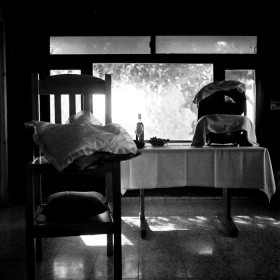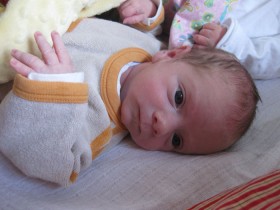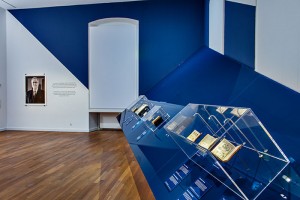
Before the circumcision ceremony: the godfather’s chair and the infant carrier with Yair © photo: Birgit Glatzel
Naomi converted to Judaism six years ago. Shortly afterwards she became pregnant, went to live with her boyfriend Avishay in Tel Aviv, and gave birth there to a son, Yair, who was circumcised as Jewish law demands. In the meantime the couple has moved to Berlin and separated. Naomi recently showed me the photos she took at the ceremony and we talked about her thoughts on ritual circumcision, then and now.
Mirjam: What was your very first thought when you heard you were expecting a son?
Naomi: I was delighted. For Avishay and I, it was also clear from the get-go that we’d have him circumcised. But, to be honest, we neither gave the matter much thought nor prepared for it in any way. It is Jewish tradition to → continue reading

Circumsized or not, he is already practising … © private
Signe and Darrell have been together a long time. They met in the USA, have shared an apartment in Berlin for nearly 15 years, and now have two daughters and a son together. Signe’s family is Jewish American on the mother’s side, German Protestant on the father’s. Darrell is 100 % North American – in his family, you can find just about everything: Puritan pastors, Unitarian ministers, Mormons, Catholic liberation theologians, liberal Muslims, secular Jews. I talked with the two of them about circumcision and the role that Jewish tradition has played in raising their children.
You first had a daughter, then twins. One of the twins is a boy. Did you think a lot about the question of whether to circumcise your son while you were pregnant?
Signe: When I found out that one of the twins was going to be a boy, my first thought was → continue reading
An Interview with René Braginsky
When did you start collecting and how large is your collection?
René Braginsky: I started collecting books more than twenty years ago. It was my son’s Bar Mitzvah, and I was looking for an illustrated blessing for the celebration. Since I could not find one, we made do with a copy. For his wedding, however, we were able to reproduce a blessing from our own collection. As I slowly acquired a taste for collecting, I bought more objects, and of increasingly quality, whenever possible. A good friend of mine, an older collector, encouraged me. The Judaica collection now comprises more than 700 pieces: books mainly, but also illustrated wedding contracts and Esther scrolls.
What motivates you to collect Hebrew manuscripts? Do you collect with a specific objective or mission in view?

Interior view of the special exhibition “The Creation of the World. Illustrated Manuscripts from the Braginsky Collection” © Jewish Museum Berlin, photo: Martin Adam
I’m interested, first and foremost, in the direct connection with Jewish history, with my view of Jewish history. I find the sheer variety of illustrations fascinating, as well as the regional and national influences they display. Jewish books in Germany are primarily German books, just as Jewish books from Spain are primarily Spanish and those from Morocco Moroccan. Jews lived in diverse regions, in a diaspora, and the illustrations in the books reflect this. And these old books so full of erudition bring me peace and make me confident, too, that whatever is really important will always survive. The mission, if there is such a thing, is my wish to share them freely, instead of hiding these treasures from the world. That is why we published websites (braginskycollection.com und braginskycollection.ch) , put two iPad apps online (Braginsky Collection und Braginsky Collection Berlin) and chose to exhibit a part of our collection in Berlin, for the fifth time. Over the years, the exhibitions and online sources have enabled tens of thousands of people all over the world—Jews and non-Jews —to share our enjoyment of the collection.
Do you believe the market for collectors of Judaica and Hebrew manuscripts has changed over the last few decades? Have you come across any counterfeiters or crooked dealers? → continue reading


